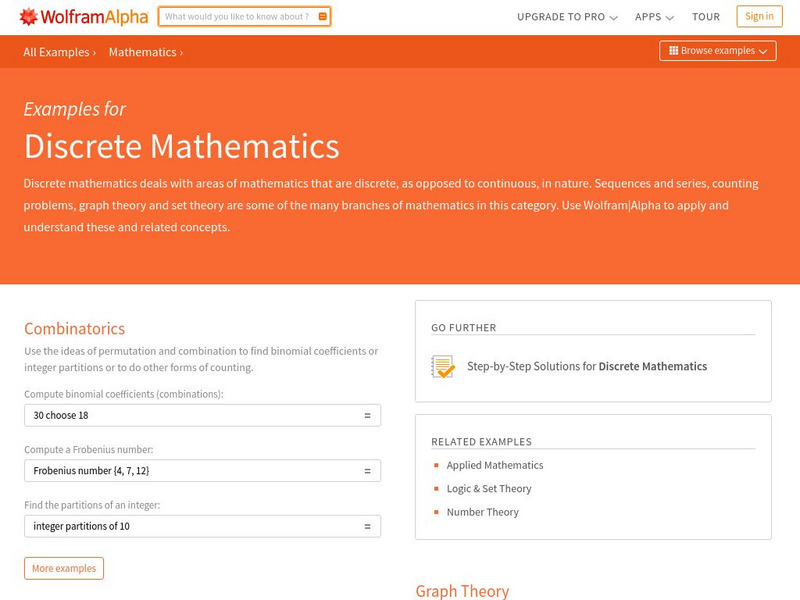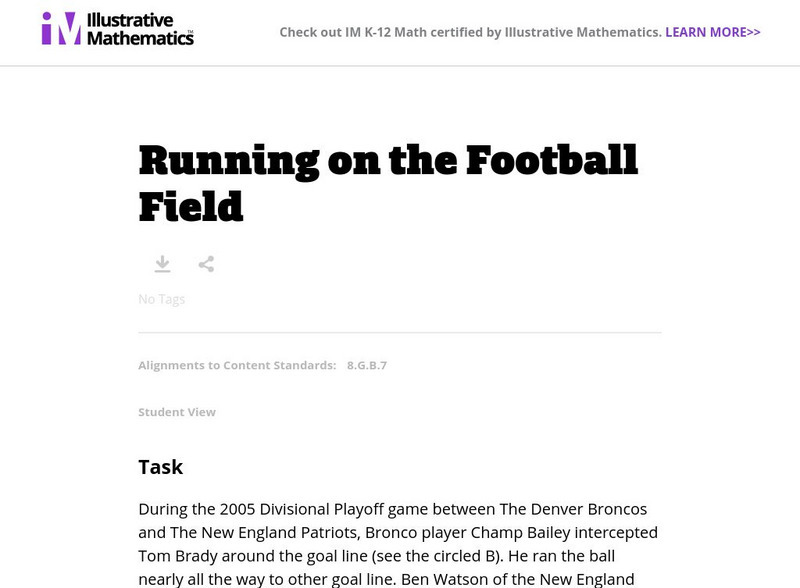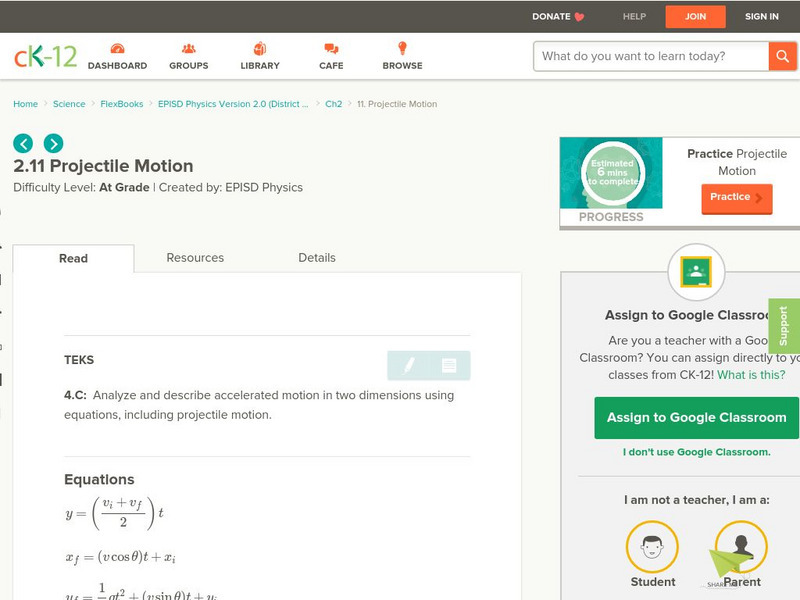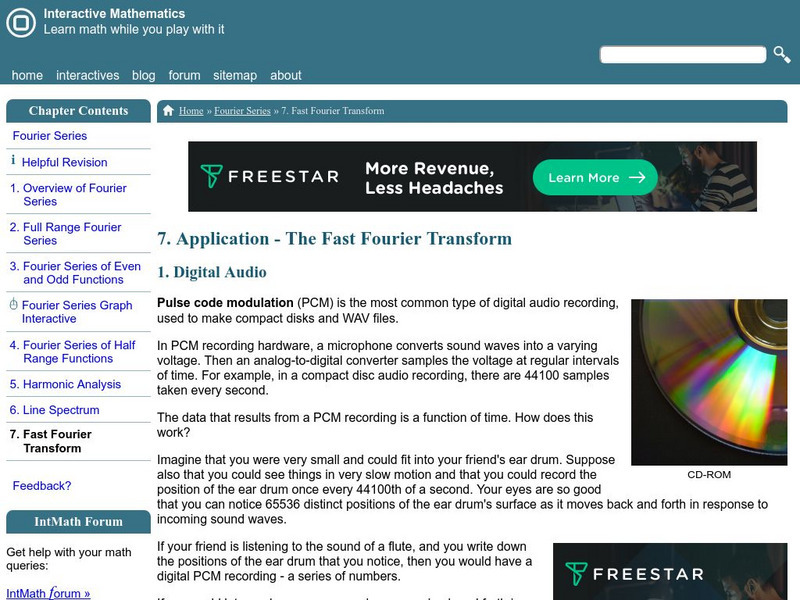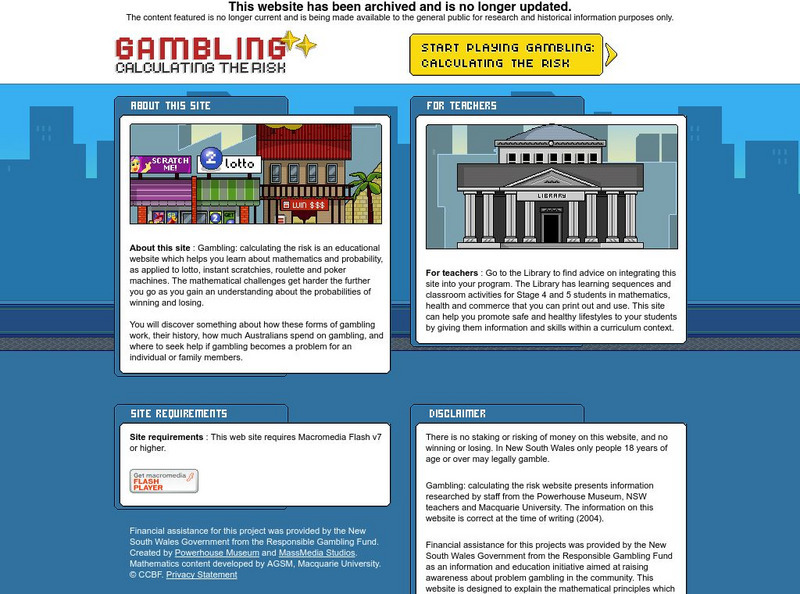Wolfram Research
Wolfram Alpha: Examples for Discrete Mathematics
Discrete mathematics deals with areas of mathematics that are discrete, as opposed to continuous, in nature. Sequences and series, counting problems, graph theory and set theory are some of the many branches of mathematics in this...
Illustrative Mathematics
Illustrative Mathematics: G Co Building a Tile Pattern by Reflecting Hexagons
This task applies reflections to a regular hexagon to construct a pattern of six hexagons enclosing a seventh. The focus of the task is on using the properties of reflections to deduce this seven-hexagon pattern. Aligns with G-CO.B.6.
Illustrative Mathematics
Illustrative Mathematics: G Srt Folding a Square Into Thirds
The goal of this task is to apply knowledge about similar triangles in order to understand an origami construction: trisection of the side of a square. Aligns with G-SRT.B.5.
Illustrative Mathematics
Illustrative Mathematics: G Gpe Triangle Perimeters
Students are shown two triangles touching points on a coordinate grid and are asked to answer questions about their perimeters. The purpose of this task is to apply the Pythagorean theorem to calculate distances and areas. Aligns with...
Illustrative Mathematics
Illustrative Mathematics: F Tf Equilateral Triangles and Trigonometric Functions
The purpose of this task is to apply knowledge about triangles to calculate the sine and cosine of 30 and 60 degrees. Aligns with HSF-TF.A.3.
McGraw Hill
Glencoe Mathematics: Quiz on the Application of Trigonometric Functions
The online assessment demonstrates knowledge of advanced mathematical concepts in Algebra II. The questions test students on the application of trigonometric functions.
Illustrative Mathematics
Illustrative Mathematics: 7.rp Sore Throats, Variation 1
A performance task asking students to choose and apply an appropriate equation to determine an equivalent ratio for two salt and water mixtures.
Illustrative Mathematics
Illustrative Mathematics: 8.g.b.7: Spiderbox
The purpose of this task is for students to work on their visualization skills and to apply the Pythagorean Theorem. Aligns with 8.G.B.7.
Illustrative Mathematics
Illustrative Mathematics: 8.g.7 Running on the Football Field
This task asks students to apply the Pythagorean Theorem to find the approximate number of yards two players ran during a football game and compare their distances. Aligns with 8.G.B.7.
Illustrative Mathematics
Illustrative Mathematics: 6.ns Multiples and Common Multiples
This task asks students to apply the concepts of multiples and common multiples in an abstract context. Aligns with 6.NS.B.4.
Stefan Warner and Steven R. Costenoble
Finite Mathematics & Applied Calculus: Linear Functions and Models: Basics: Slope and Intercept
A mathematics tutorial that allows you to interactively learn and manipulate the slope and intercepts of a line.
Stefan Warner and Steven R. Costenoble
Finite Mathematics & Applied Calculus: Exponential Functions and Models
The resource investigates exponential functions and models. Students learn about the concepts through notes and examples. A chapter quiz, review exercises, and chapter summary are included.
CK-12 Foundation
Ck 12: Episd: Projectile Motion
[Free Registration/Login may be required to access all resource tools.] Applying mathematic equations, study how two dimensional acceleration and projectile motion are calculated.
Illustrative Mathematics
Illustrative Mathematics: G Mg How Thick Is a Soda Can? Variation I
In this task, students are given the dimensions of a soda can and are asked to estimate its thickness. They must first find the surface area and the volume of aluminum. Aligns with G-MG.A.1 and G-MG.A.2.
Shodor Education Foundation
Shodor Interactivate: From Probability to Combinatorics and Number Theory
Apply division to determine the probability of outcomes with a racing game.
Texas Education Agency
Texas Gateway: The Language of Physics: Physical Quantities and Units
By the end of this section, you will be able to associate physical quantities with their International System of Units (SI) and perform conversions among SI units using scientific notation; relate measurement uncertainty to significant...
Interactive Mathematics
Interactive Mathematics: Fast Fourier Transform
The Fast Fourier Transform is applied using examples of digital audio recording. Connections to frequency are made through prisms and the cochlea of the ear.
TeachEngineering
Teach Engineering: Patterns and Fingerprints
Students apply several methods developed to identify and interpret patterns to the identification of fingerprints. They look at their classmates' fingerprints, snowflakes, and "spectral fingerprints" of elements. They learn to identify...
Stefan Warner and Steven R. Costenoble
Finite Mathematics & Applied Calculus: Mean, Median & Standard Deviation
Students learn about mean, median, variance, and standard deviation. The tutorial investigates the statistics concepts though class notes and examples. Review exercises are included.
My Hero Project
My Hero: Galileo
"First to use a telescope to overserve the starts and planets," Galileo Galilei secretly published his work, which contradicted the Catholic Church's teachings. Use this site to learn about how Galileo's independence and courage made him...
Stefan Warner and Steven R. Costenoble
Finite Mathematics & Applied Calculus: Monty Hall Simulation
The simulation investigates the Monty Hall problem.
Alabama Learning Exchange
Alex: What Is the Slope?
The purpose of this lesson is to help learners apply the mathematical definition of slope to a concrete example. The students will learn to make the appropriate measurements and apply the formula to calculate the slope of the stairs...
Science Education Resource Center at Carleton College
Serc: How Can We Measure the Wavelength of Light Emitted From Stars?
This activity is designed for students to apply their knowledge of mathematics and physics to "real life" situations. Students are presented with the situation that they are on a camping trip and wish to know the wavelength emitted by a...
Museum of Applied Arts and Sciences
Powerhouse Museum: Gambling (Math and Probability)
The resource consists of activities about mathematics and probability. Students learn about the history of gambling and the risk applied to the lotto, instant scratch-offs, roulette, and poker machines.
